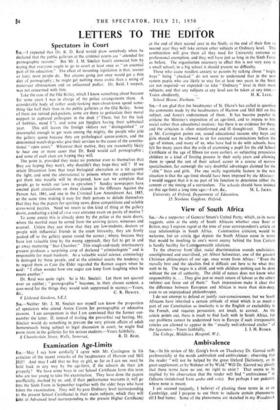TO THE EDITOR
LETTERS
Spectators in Court
expected that Dr. R. D. Reid would draw somebody when he declared that the public galleries at the criminal courts are " attended for pornographic reasons." But Mr. J. M. Sinclair hasn't answered him by saying that everyone ought to go to court at least once as " an essential part of his education." The effect of mounting legislation is that, sooner or later, most people do. But anyone going just once would get a thin diet of pornography ; he might ket nothing more erotic than a string of motor-car obstructions and an unlicensed pedlar. Dr. Reid, 1 suspect, was not concerned with him.
Take the case of the Old Bailey, which I know something about because for some years I was in charge of the police arrangements there. A considerable body of rather seedy-looking men-about-town spend some- thing like half their lives in the public galleries at the Old Bailey. Some of them are retired pickpockets, some are there to gesticulate their moral support to captured colleagues in the dock ("There, but for the lack of bobbies, stand 1"), and some are byrglars having their sabbatical year. This still leaves the foreign visitors not " distinguished " or resourceful enough to get seats among the mighty, the people who join the gallery queue because they are pathological queue-joiners., and the determined watch-dogs who give their services to the cause of the constitu- tional " open court." Whatever their motive, they are reasonably likely to hear one or more cases that Dr. Reid would call pornographic ; and some of each class are hoping they will.
The point is. provided they make no pretence even to themselves that they are hoping they won't, why shouldn't they hope they will ? If we retain Draconian laws that treat biological aberration as a sin against the light, and send the aberrational to prisons where the appetites that got them into trouble will be sharpened, how can we complain that people go to watch our laws in operation ? Sunday newspapers have erected giant circulations on three clauses in the Offences Against the Person Act, 1861, and one in the Criminal Law Amendment Act, 1885, at the same time making it easy for their patrons to delude themselves that they buy the papers for sporting news, dress competitions and soluble cross-word puzzles. Need we resort to this kind of thing at the gallery doors, conducting a kind of viva voce entrance exam on purity of motive ?
To some extent this is already done by the police at the main doors, where the morbid mast be sorted from the arriving jurors, witnesses and counsel. Unless they can show that they are law-students, doctors or people with influential friends in the court hierarchy, they are firmly packed off to the gallery queue round the corner ; where, because they have lost valuable time by the wrong approach, they fail to get in and go away muttering " Star Chamber." This rough-and-ready interlocutory process produces a surprising crop of declared " criminologists" and is responsible for much bunkum. As a valuable social science, criminology is damaged by these people, and at the criminal courts the tendency is to regard them as Cato the Elder regarded the Roman augurs when he said: " I often wonder how one augur can keep from laughing when he meets another."
Dr. Reid was quite right. So is Mr. Sinclair. Let them not quarrel over an epithet ; " pornographic" becomes, in their chosen context, a cuss-word for the things they would wish suppressed in secrecy.—Yours,


































 Previous page
Previous page